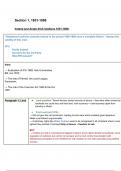Section 1, 1851-1886
Ireland and Anglo-Irish relations 1851-1886:
“Gladstone’s policies towards Ireland in the period 1868-1886 were a complete failure”. Assess the
validity of this view.
CFJ:
- Pacify Ireland
- Success for the Lib Party
- Was IHR passed?
Intro:
→ Evaluation of ICA 1869, Irish Universities
Bill, ILA 1870;
→ The role of Parnell, the Land League,
Fenianism;
→ The role of the Coercion Act 1880 & the ILA
1881
Paragraph 1: Land ● Land question: Tenant farmers lacked security of tenure – they were often evicted by
landlords nor could they sell their land. Irish economy = rural economy apart from
industry in Ulster.
● First Land Act (1870):
→ Did not give fair rent protection, leading to land wars which enabled great departure.
Made rural Ireland ungovernable.
→ Customary rights like Ulster Custom were to be recognised in all of Ireland where it was
agreed they existed. Promised fixity of tenure + freedom to sell.
BUT:
→ It failed as it led to unproductive litigation trying to prove rights denied by landlords; some
regulation of evictions but not for rent arrears and no rent control (inconsistent with
Gladstonian principles of non-interference with market) so rent rises preceded and justified
eviction.
,→ No mechanism for fair rent so growth in evictions.
→ Tenants on leases of 31 years or more were excluded from the act. Land purchase
measures suggested by the radical Liberal Bright (‘Bright’s Clause’) is diluted because of
Whig objection to government intervention that would undermine protestant landlords:
tenants can borrow up to 2/3rds of the value of the land (at 5%) repayable over 35 years to
buy the land they rent (if landlord will sell).
→ Whilst the Act failed to achieve the 3Fs or otherwise resolve the Irish land problem,
Gladstone’s departure from Victorian attitudes of non-intervention in the market does
indicate a symbolic value: Ireland is a special case deserving special treatment.
BUT: Protestant Ascendancy, already alarmed by the religious reform of 1869, feel
threatened. The tenant farmers of the Irish Tenant League were frustrated with the failure of
the 1870 legislation, especially the failure to control rents – big problem when the
depression hit farming in the 1870s.
→ 1877, in his only visit to Ireland, Gladstone considered he had achieved a permanent
solution to the land question. But land was the ‘question of questions for Ireland’ (John
Devoy, Fenian, Land League).
● Land League’s 3 Fs – Freedom to sell, Fair rent, Fixed tenancies:
→ Parnell placed pressure on Gladstone as leader of Home Rule League and President of
Land League uniting with Fenians to begin the ‘Great departure’ – the uneasy alliance of
constitutional and revolutionary nationalists.
→ Parnell was unique in that he united both parts of Irish nationalism: Fenians (who wanted
Irish independence) and Home Rulers.
→ ‘Land Wars’ started by the League: campaign of boycott, non-payment of rent,
occupation and violence towards landlords, their agents and police. It makes rural Ireland
‘virtually ungovernable’.
→ Coercion Act 1880: passed in response to land wars (parliamentary ‘guillotine’ first
established to stop obstruction by Irish HR MPs) and Davitt immediately arrested (the
League was banned).
BUT:
→ Resistance to Coercion Act unified home rulers, now called the Irish Parliamentary Party
(IPP) and increased prestige of Parnell, who had just returned from successful
tour of the USA. Parnell elected leader of IPP, the ‘uncrowned King of Ireland’ (with
opponents still in IPP, concerned over his flirtation with rural radicalism). Supported by
Catholic church; 80% of Ireland Catholic.
● 2nd Land Act 1881:
→ Passed in response to the Land Wars. Fair rent was fixed for 15 years by Land Courts
(independent of landlords), eviction was only justified on grounds of rent arrears (fixity of
tenure achieved) + tenant’s interest in land was legally recognised with compensation for a
tenant when the land was sold. Extended 3 F’s to farmers.
, → Tenants could sell their interest in the land at market price without interference from the
landlord.
→ Generous land purchase scheme was set up – far more generous than its 1870
predecessor. The Land Courts reduced rents by 20%.
BUT:
→ Despite the achievement of the 3 Fs, problems remained: rent arrears had accumulated
during the land wars (130,000 tenants).
→ The land purchase was not as popular with tenants as anticipated and in the west of
Ireland the problem of smallholders consisted of a lack of cultivable land and small plots of
land (land hunger) not unfair rent.
→ Parnell put in a difficult situation: could lose radical Irish support or reject it and lose
moderate Irish support placed in Kilmainham prison in Dublin (for 6 months. Parnell’s
prestige in Ireland dramatically escalated as did rural violence.
→ 1882: Kilmainham ‘Treaty’ between Gladstone and Parnell agreed: the government
agreed to release Parnell from prison, relax coercion and help those in rent arrears
in exchange for Parnell’s support of the Land Courts and the ILA 1881.
BUT:
→ Phoenix Park murders sabotaged progress achieved by governement and Parnell. Home
Secretary Forster had already resigned in protest. Pursuing IHR or furthering land reforms
would be politically damaging.
Paragraph 2: ● Political: The electorate was predominantly Catholic and subject to the same
Political/ IHR problems of British Victorian representative democracy. Political problem. Ireland was
ruled by the ‘Protestant Ascendancy’.
● Home Rule:
→ Gladstone became PM in 1868: ‘My mission is to pacify Ireland’ and he began a
Liberal crusade to reform Ireland. Problem or opportunity for the divided Liberal Party.
BUT:
→ Irish representation in Westminster was to be replaced by the Irish Parliament. Ireland
would therefore lose any influence on trade, defence and foreign policy. Not enough for
Fenians.
→ The Bill did not mention the Protestant minority or include religious safeguards for them.
Non-conformists like Bright objected to this lack of safeguards.
→ The Union was seen as a guarantee of religious freedom and economic prosperity;
Home Rule was seen by Protestants as the start of religious persecution and agrarian
policies that would undermine their economic power. Conservatives played the 'Orange
(Ulster protestant) card' sparking anti-Home Rule riots in Belfast (1886). Gladstone
appeared ignorant of sectarianism.





